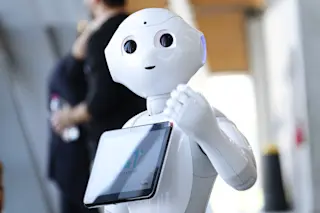The Pepper robotic assistant. (Credit: MikeDotta/Shutterstock)As prices drop and their functionality expands, you can expect to see humanoid robots in more places, including schools, airports, and hospitals. That’s made researchers curious how androids and their kin will influence human behavior. In a study published today, scientists found that meaner, colder robots can help people concentrate — and that could help us better understand human-robot relationships.The experiment, published in Science Robotics, was based on something called the Stroop Task, a widely-used neuropsychology trial once described as the “gold standard” of attentional tests. It challenges participants to name the colors of words and ignore their meanings while calculating reaction time. For example, if you see the word “blue” in yellow letters, there’s a lag as your brain struggles to say the actual color yellow instead of the word “blue”. One explanation for this phenomenon is that your brain processes words faster than ...
People Think Differently Around Robots — Especially When They're Mean
Discover how human-robot relationships evolve as mean robots improve focus in cognitive tasks like the Stroop Task experiment.
More on Discover
Stay Curious
SubscribeTo The Magazine
Save up to 40% off the cover price when you subscribe to Discover magazine.
Subscribe













